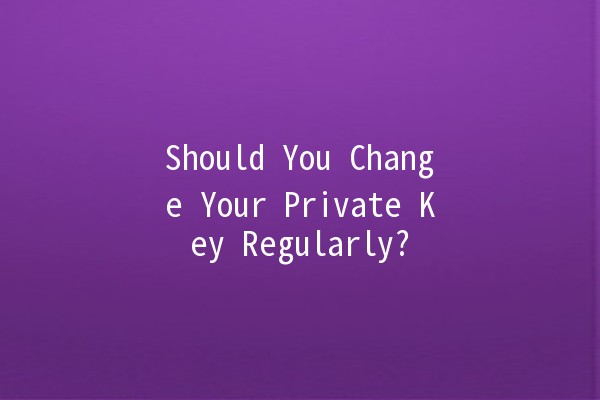
In the world of cryptocurrency and digital security, the question of whether to regularly change your private key emerges as a significant concern. As a unique source of access to your digital assets, private keys hold immense responsibility. This article delves into the reasons behind private key management, explores whether regular changes are needed, and offers practical advice to enhance your security practices.
Understanding Private Keys
What Are Private Keys?
Private keys are cryptographic keys that allow you to access and manage your cryptocurrencies. They are essentially a secret code that proves your ownership of the assets stored on a blockchain. Without the private key, you cannot initiate transactions or access your digital wallet.
The Importance of Security
Given the decentralized nature of cryptocurrencies, security becomes even more critical. Unlike traditional banking, where there are recovery options, if you lose your private key, you lose access to your assets permanently. This reality underscores the importance of maintaining robust security practices, including the management of your private keys.
The Debate: Should You Change Your Private Key Regularly?
Arguments For Changing Keys

Example: If you’ve entered your private key into an untrusted application, it’s vital to change it right away to protect yourself from theft.
Arguments Against Changing Keys
Example: Suppose you are holding multiple cryptocurrencies with different wallets, and you forget where you saved a changed private key. This negligence could result in a complete loss of access.
Five Practical Tips for Managing Your Private Keys
Explanation: A hardware wallet securely stores your private keys offline, away from potential cyber threats.
Application: Invest in a reputable hardware wallet like Ledger or Trezor to reduce exposure to online threats. When you want to make a transaction, connect the wallet to your device to sign transactions securely.
Explanation: 2FA adds an additional layer of security by requiring both your private key and a secondary code sent to a device you control.
Application: Whenever possible, enable 2FA on your cryptocurrency exchanges and wallet services to provide a robust defense against unauthorized access.
Explanation: Awareness of phishing scams reduces the likelihood of compromising your private key through social engineering attacks.
Application: Regularly educate yourself about the latest phishing methods and train yourself to recognize suspicious emails or messages before disclosing any sensitive information.
Explanation: Backup your private keys in multiple secure locations to prevent loss.
Application: Store your keys on physical devices or encrypted USB drives in safe locations. Consider using a combination of cloud storage with strong encryption and physical backups for added safety.
Explanation: A multisignature wallet requires multiple keys to authorize a transaction, making unauthorized access significantly harder.
Application: Use a multisig wallet for substantial holdings or joint accounts to distribute control and enhance security. This setup minimizes the chances of a single key compromise leading to loss.
Common Questions
Losing your private key means losing access to your cryptocurrency assets. Unlike conventional banking, there are no recovery options for lost private keys. Always back up your keys securely to prevent this situation.
Signs of compromise include unusual transactions from your wallet or notifications from exchanges about unauthorized access attempts. Always monitor your wallet and transactions closely and act quickly if you observe anything suspicious.
Yes, alternatives like social recovery wallets or hardware wallets that use biometric authentication can provide enhanced security. Always keep abreast of new technologies entering the security space.
Use a hardware wallet for offline storage, supplemented by encrypted backups in secure locations. Avoid storing keys in plain text files or on devices connected to the internet.
Cloud storage can be secure if encrypted and you take additional steps to protect your account (e.g., strong passwords, 2FA). However, the safest method involves keeping backups offline in a separate physical location.
While many security experts suggest changing keys regularly, it largely depends on your individual risk profile and threat model. Assess your situation to determine if changes are necessary or if robust security practices suffice.
By leveraging these tips and understanding the implications of private key management, you can significantly enhance your digital security posture. Protecting your private key is a proactive measure that pays dividends in securing your cryptocurrency assets. Remember, the best practices for securing your private keys form the backbone of your personal security strategy in the digital age.

